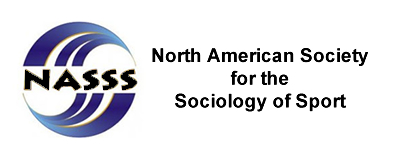Conference Theme: Publicly Engaged Sociology of Sport
Inspired by recent momentous cultural events, the conference theme questions and considers the role of sport sociology and sport sociologists in public engagement. In the context of growing economic inequality, we see public money being siphoned into private stadiums within professional sport, corruption within international sporting organizations, and U.S. college coaches being the highest paid employees in state institutions within ‘amateur’ sport. In a time of continued and deadly racial violence, sport remains segregated and stratified in terms of sports, positions, and particularly in terms of positions of power. Even as girls and women demonstrate unflagging interest in sport in all levels and types, they are still recognized primarily for how they look rather than for what they can accomplish. We have witnessed marriage equality for all people in the United States and many places around the world, regardless of sexuality, yet ‘out’ gay male athletes remain rare in the highest levels of sport. We watch technology transform the athletic possibilities of those with a variety of physical impairments, at the same time that access to sport participation remains a barrier. Importantly, as we know, none of these brief examples work in isolation of the others. The clear, and also submerged, intersections offer fruitful examinations in much of the work that we do within our field. As Don Sabo (1995) noted in his NASSS presidential address, “Sport sociologists from the political left to the political right are embroiled by the politics of knowledge construction, and our myriad identities as theorists and researchers bring us closer to, or push us further from, the concerns and needs of community” (p. 248). Thus, what is our role beyond the study of sport? Who should be responsible for public engagement? How do we do it?
While much of our work becomes public through publication or presentation, how accessible is our work, both in terms of the language we use and where our work appears? How civically and politically engaged are we in our various publics? How much does our work inform public policies? Are our voices being heard through the media outlets from which most people gain their information? What are our moral obligations? As journalist Dave Zirin (2008) argued, in “Calling Sport Sociology off the Bench,” “The athletic industrial complex keeps throwing pitch after juicy pitch down the middle of the plate. It’s time for sports sociologists to get the bats off their shoulders and begin to shape debates within the sports world.”
In keeping with the conference theme, sessions may highlight examples of successful public engagement or areas where we might more fruitfully expand our reach. Examples of publicly engaged sociology of sport include many different approaches, such as: activism, sport for peace and development, social work, critical coaching, critical pedagogy, centers (e.g. for the sociological study of sport or for influencing public policy), engagement with the media, self authored media (e.g. blogging), and others. Session organizers are welcome to engage the theme in creative and innovative ways. This call will generate session topics for conference participants to choose from during the Call for Abstracts in April. Session organizers for included sessions are responsible for accepting or declining participants to their sessions.
Session Formats
Please note the following different format options:
- Traditional paper presentation sessions (4 – 5 papers per session). These sessions will be open to submissions of well developed research during the call for paper abstracts.
- Completed paper presentation sessions, whereby the entire session is pre-constituted (4 – 5 already selected papers fitting with the session topic). For these sessions, include the name, institutional affiliation, and title of each presenter along with the session abstract. The individual paper abstracts for these sessions will be due at the same time as other abstracts. These sessions can also include a commentator, who should be listed in the session proposal.
- Panel sessions, with a focused theme to be addressed by a panel of discussants. Session organizers should include the names and institutional affiliations of panel members along with the session abstract.
- Roundtable sessions, which can include less developed, preliminary or exploratory research. These sessions can include 4 – 5 presenters for 5 minute introductions of research, followed by discussion among those presenting and conference attendees who join the roundtable. These sessions can be open for abstract submissions or can be pre-constituted. Pre-constituted sessions should include the names and institutional affiliations of all presenters. Abstracts for pre-constituted sessions will be due at the same time as all other abstracts.
Timeline
The Call for Abstracts will be released on April 15, 2016. Deadline for submission of individual Paper Abstracts is June 30, 2016. Session organizers will notify authors of abstract acceptance and submit their completed sessions (4-5 papers/presentations) no later than July 15, 2016. Final completed session submission is due July 15, 2015.
Questions
Direct any questions to the Conference Committee Chair, Theresa Walton-Fisette at NASSS2016@kent.edu
Tampa Bay +1 Initiative
In partnership with the Diversity and Conference Climate Committee Chair, Dr. Algerian Hart, the 2016 Conference Committee is pleased to continue the “+1” initiative. The goal of this initiative is to expand the audience for the NASSS conference to include those who have never attended the NASSS conference or who have not attended for some time. NASSS members are encouraged to invite a +1; this can be a colleague, student, peer, or friend who has never been to NASSS and to invite them to register and participate in the conference. As you are considering organizing a session and/or submitting an abstract, we encourage you to bring to your +1 to Tampa Bay!
Share the Call
Feel free to distribute this Call for Sessions and the coming Call for Abstracts with your colleagues, other academic networks, organizations and listservs.
